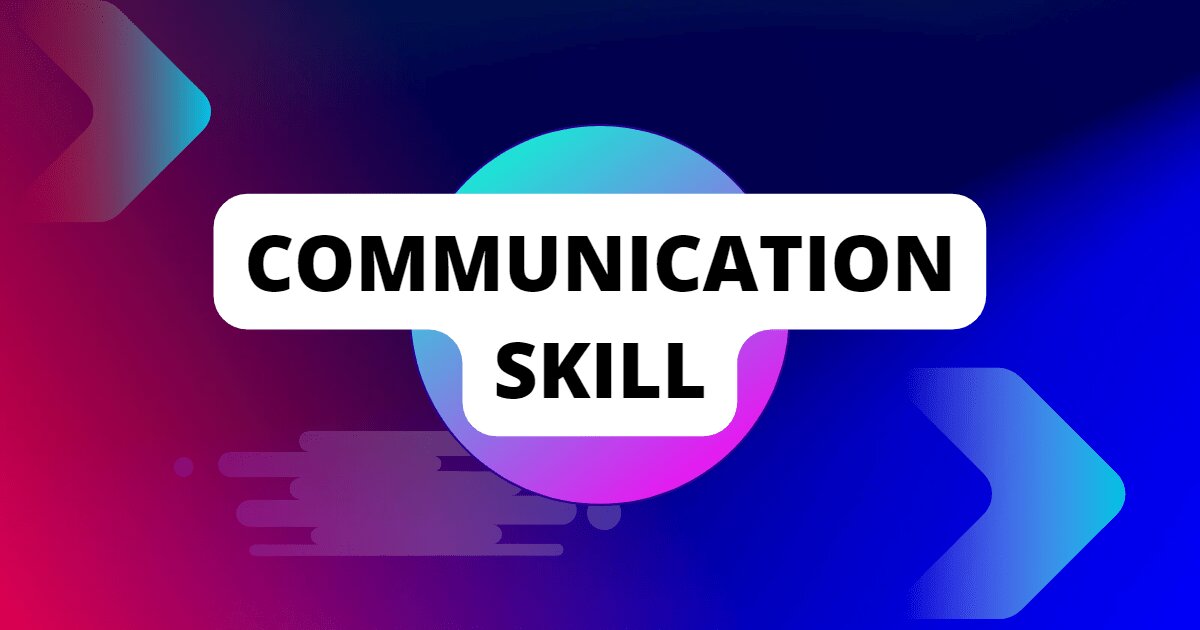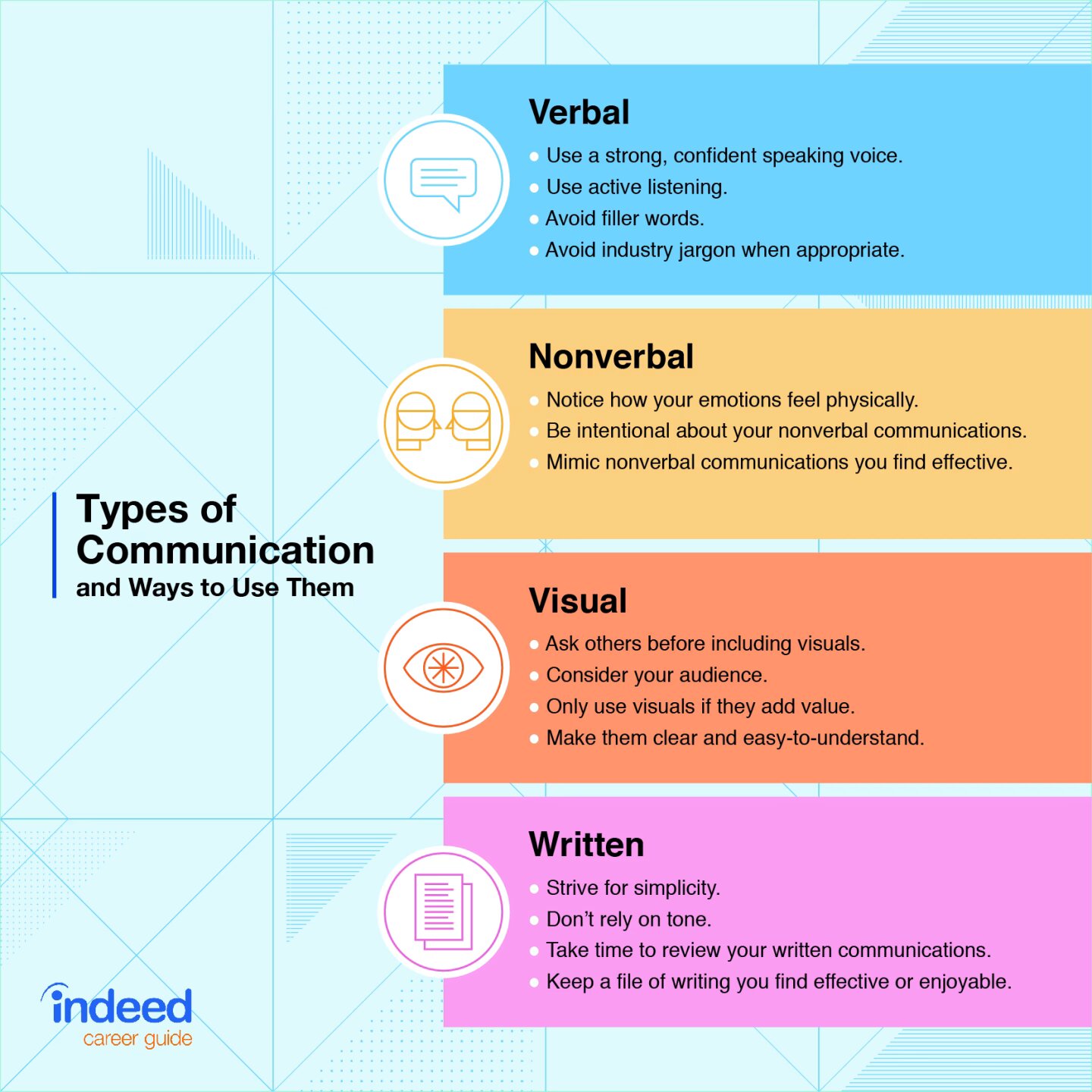
Employers routinely included communication skills as one of the most sought-after abilities in job ads. Improving and demonstrating your communication skills will help you advance your career and remain competitive in today’s work environment. Learning about these techniques can also help you focus on specific aspects of your communication.
Nonverbal communication is one of several strategies that can help you make a good impression during interviews and in your professional life. However, applicant evaluations should be based on abilities and qualifications, and businesses should endeavor to be inclusive and respectful of individual communication styles.
What are communication skills?
Communication skills are the abilities you employ to give and receive different types of information. While these abilities may be part of your daily job routine, speaking clearly, effectively, and efficiently is an extremely important and helpful skill. Learning from great communicators and regularly practicing techniques to develop your communication skills over time will surely help you reach a variety of personal and professional goals.
Listening, speaking, watching, and empathizing are all communication skills. It’s also important to comprehend the variations between face-to-face contacts, phone discussions, and digital communications such as email and social media.
Types of communication

There are four main types of communication you might use on a daily basis, including:
- Verbal: Communicating by way of a spoken language
- Nonverbal: Communicating through body language, facial expressions and tone
- Written: Communicating with written language, symbols and numbers
- Visual: Communication by way of photography, art, drawings, sketches, charts and graphs
Top 10 communication skills
1. Active listening
Active listening, also known as appreciative listening or mindful listening, entails paying close attention to the person with whom you are interacting by engaging them, asking questions, and paraphrasing. Active listening can help you create respect with your coworkers and improve understanding in the office. While actively listening, keep your attention on the speaker and avoid distractions like cell phones and laptops.
Improve your active listening abilities by observing other people’s facial expressions, body language, and tone of voice. Instead of planning what you’ll say next, concentrate on what the other person is saying and how they’re speaking. If you need to clarify something, ask follow-up questions or restate what they’ve said to ensure that you understand correctly.
2. Using the right communication method
Communicating effectively is a crucial skill. There are pros and disadvantages to communicating by email, letters, phone conversations, in-person meetings, and instant messages. Communicating is more effective when you evaluate your audience, the information you want to offer, and the best approach to do it.
For example, if you’re speaking with a potential employer, it may be more appropriate to write a formal email or contact them. In the workplace, it may be easier to deliver difficult material in person or over a video conference than by email. Building distant professional friendships becomes easier when you can communicate via instant chats.
3. Friendliness
Friendly characteristics such as honesty and kindness can help to create trust and understanding when interacting at work. Try to speak positively, have an open mind, and ask questions to better understand where they’re coming from. Small gestures like asking someone how they’re doing, smiling as they talk, or praising them for a job well done can help you build productive connections with coworkers and superiors.
You can cultivate friendliness by recalling modest, thoughtful facts about your coworkers or previous talks. For example, if a coworker informs you that their child’s birthday is approaching and you reconnect with them later, you might inquire about how the birthday celebration went.
4. Confidence
In the workplace, people are more inclined to respond to confidently delivered ideas. There are numerous techniques to appear confident, such as making eye contact while addressing someone, sitting up straight with your shoulders open, and planning ahead of time so that your thoughts are clear and you can answer any inquiries. Confident communication is crucial not just at work, but also during job interviews. Additionally, to convey confidence, avoid using filler words.
5. Sharing feedback
The key to providing effective feedback is to share particular examples of the issue and its effects, as well as to ask questions in order to build solutions. Strong communicators can receive and deliver constructive feedback to others.
Feedback can answer problems, suggest solutions, or help to strengthen the project or topic at hand. Providing and accepting feedback is a vital workplace skill since it allows you and those around you to make significant improvements to their job and professional development.
Taking notes on other people’s feedback is an excellent approach to learn how to give feedback. When you come across a well-explained piece of feedback, take some time to notice and understand why it was good, why it resonated with you, and how you may use those abilities in the future.
6. Volume and tone
When you speak, be clear and audible. Adjusting your speaking voice so that others can hear you in various situations is a skill that is essential for efficient communication. Speaking too loudly can be impolite or embarrassing in some situations. If you’re unsure, scan the room to observe how other people are communicating.
Vocals and intonation are also important aspects of spoken communication. This includes how your tone changes up and down, your pitch, the words you emphasize, and the pauses you make between phrases. Such nuances can be beneficial in conveying emotions and providing insights into how people perceive your message.
7. Empathy
Empathy is a communication skill that allows you to understand and share the emotions of others. It is useful in both team and one-on-one settings, allowing you to effectively read and translate their emotions and respond appropriately. Empathy can help you acknowledge and diffuse someone’s anger or frustration, while also recognizing when someone is feeling fearful.
8. Respect
Knowing when to initiate and respond to communication is an important component of showing respect. Allowing people to talk uninterrupted in a team or group situation is regarded as a necessary communication skill associated with respect. Respectful communication also entails making good use of your time with others, such as remaining on topic, asking clear questions, and replying fully to any questions they may have asked you.
9. Nonverbal cues
Nonverbal clues such as body language, facial emotions, and eye contact help people communicate. When listening to someone, you may choose to focus on what they are saying as well as their nonverbal communication. It is critical not to judge others based on their body language, as not everyone uses the same physical signals owing to cultural or ability disparities.
10. Responsiveness
Employers frequently consider rapid communicators to be more effective than those who are sluggish to answer, whether they are returning a phone call or sending an email. One approach is to assess how long your reaction takes. Is this a request or query you can respond within the next five minutes? If this is the case, it may be best to treat it as soon as possible. If the request or question is more complex, you can still confirm receipt and inform the other person that you will respond in full later.
How to highlight communication skills on your resume
- Communication skills on your resume
A well-written resume is an indication of effective communication abilities. Make sure your resume has an effective and professional format that is free of spelling and grammatical problems. You may also want to highlight some positive communication talents in your resume skills section, especially if the job posting requires specific communication skills in the description. You can include skills on your Indeed Resume if businesses are looking for candidates with your skill set.
- Communication skills on your cover letter
The first way you can communicate during your interview is by presenting yourself. Arrive at the interview 10-15 minutes early and dressed suitably for the position for which you are seeking. Pay attention to the nonverbal clues you’re sending through your body language.
Avoid slouching or staring at your phone throughout the interview.
Looking your interviewer in the eye, using active listening skills, and exuding confidence are all excellent methods to communicate throughout your interview. Almost everything you do, both at work and in everyday life, is a kind of communication. You can increase your ability to connect and interact with others by understanding your skills and shortcomings and exercising positive behaviors on a consistent basis.
How to improve your communication skills
With experience and practice, you can learn and improve your communication skills. Start by identifying your strengths and then practice and develop those areas.
- Observe good communicators around you: Identify people, including family and friends, who consistently convey ideas and information with clarity, empathy, and confidence. Observe and take notes on their distinct communication styles with others.
- Ask a close friend or colleague for constructive feedback: To obtain an objective judgment, ask a trusted buddy for their honest feedback. Understanding your communication improvement areas might assist you decide where to focus your efforts.
- Practice improving communication habits: You can improve your communication skills by adopting new habits. This could involve becoming more sensitive to communications, reminding yourself to make eye contact, practice offering positive comments, and asking questions during conversations.
- Attend communication skills workshops or classes: There are a variety of online and offline seminars, conferences, and programs available to assist you improve your communication skills. These classes may include lecture, role-playing, written assignments, and open discussion.
- Seek opportunities to communicate: Seek out opportunities both on and off the job that require you to use communication skills. This may help you keep good skills fresh while also allowing you the opportunity to practice new skills.
Communicating effectively in the workplace
Be clear and concise
- Making your message as simple to understand as possible decreases the likelihood of misunderstandings, speeds up projects, and allows others to easily grasp your objectives. Instead of using long, comprehensive sentences, practice condensing your message to its fundamental meaning. While providing context is beneficial, it is important to include only the most essential information while attempting to communicate your idea, instruction, or message.
Practice empathy
- Understanding your colleague’s sentiments, views, and aspirations can help you communicate effectively with them. For example, you may require assistance from other departments to get a project started. If they are unwilling to help or have reservations, empathizing with them might help you arrange your message in a way that answers their fears.
Assert yourself
- It is often vital to be forceful in order to achieve your goals, whether you are asking for a raise, looking for project chances, or fighting a notion you do not believe would be useful. While presenting with confidence is vital in the business, remember to be respectful in discussion. Maintaining an even tone and presenting solid justifications for your assertions may make others more receptive to your ideas.
Be calm and consistent
- When there is a disagreement or conflict, it is natural to include emotion in your conversation. Maintain a cool demeanor when interacting with colleagues. Maintain a calm demeanor and an even tone of voice so that you can reach a pleasant and fruitful resolution.
